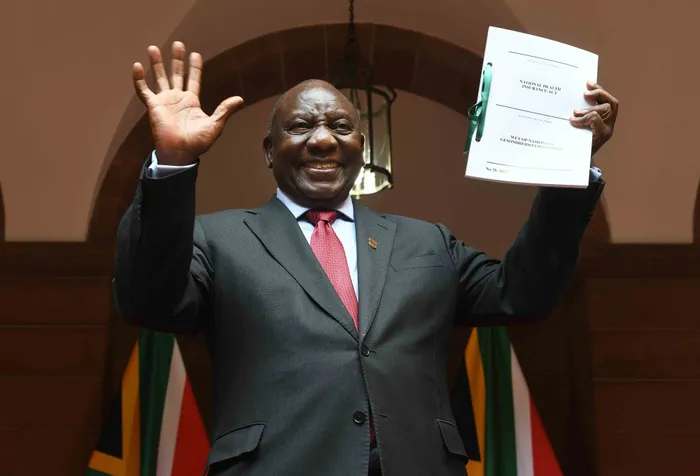
President Cyril Ramaphosa signing the National Health Insurance Bill into law at the Union Buildings.
Image: Picture: Jacques Naude / Independent Newspapers
THE North Gauteng High Court’s ruling that President Cyril Ramaphosa's decision to sign the NHI Bill into law could be subjected to judicial review does not pose any burden upon the presidency.
That is how Cosatu reacted to this week’s outcome following a legal challenge by the Board of Healthcare Funders (BHF) and the South African Private Practitioners Form to review and set aside Ramaphosa’s decision to assent to and sign the NHI Bill. They want the court to direct the President to reconsider the NHI Bill.
The BFA said the court’s decision also affirms the organisation’s right, as the applicant, to receive the full record of the President’s decision-making process, which they believe will demonstrate that he ignored compelling legal and policy objections submitted by multiple stakeholders across civil society, business, and the healthcare sector.
However Cosatu said they were confident with the “extensive work done on the NHI Act at Nedlac and Parliament, that it can sustain any legal challenges".
“This is a standard legal requirement to enable a court to provide judgement on any case before it. This is a simple administrative matter and (we) do not believe it poses any burden upon the Presidency as he would be provided detailed reports and recommendations before assenting to any legislation,” said Cosatu Parliamentary coordinator, Matthew Parks.
Cosatu maintained that they supported the Act and NHI as the “best path towards achieving universal healthcare”.

President Cyril Ramaphosa signed into law the National Health Insurance (NHI) Bill in a bid to achieve universal healthcare coverage for all.
Image: GCIS
“The status quo is not sustainable with a public healthcare system that is overwhelmed and under funded and a private healthcare system that is unaffordable and under utilised. As a result millions of workers die prematurely or can no longer work due to ailments that could have otherwise been treated.“This plunges their families into poverty, undermines workplace productivity and economic growth and drains the state of scarce resources.”
General Industries Workers Union of South Africa (Giwusa) said transparency and accountability were supported however the context of this case was an opposition from those that are "profiteering from the healthcare crisis of this country including chronic illnesses, injury, disease”.
Giwusa president, Mametlwe Sebei said: “Healthcare remains highly elite, racialised and expensive, that is the context and we should therefore reiterate as much as we require transparency and accountability for the decisions of public officials, I do not think the voice of the organised labour movement, particularly representation of the black working class is adequately or represented in any meaningful way in these proceedings. The working class must organise to defend against the fierce opposition of private healthcare monopolies, their political allies and assortment of other parasitic interests profiteering from the illness, injury and death of the people in this country.”
The presidency did not respond to a request for comment by deadline.
Cape Times
Related Topics: